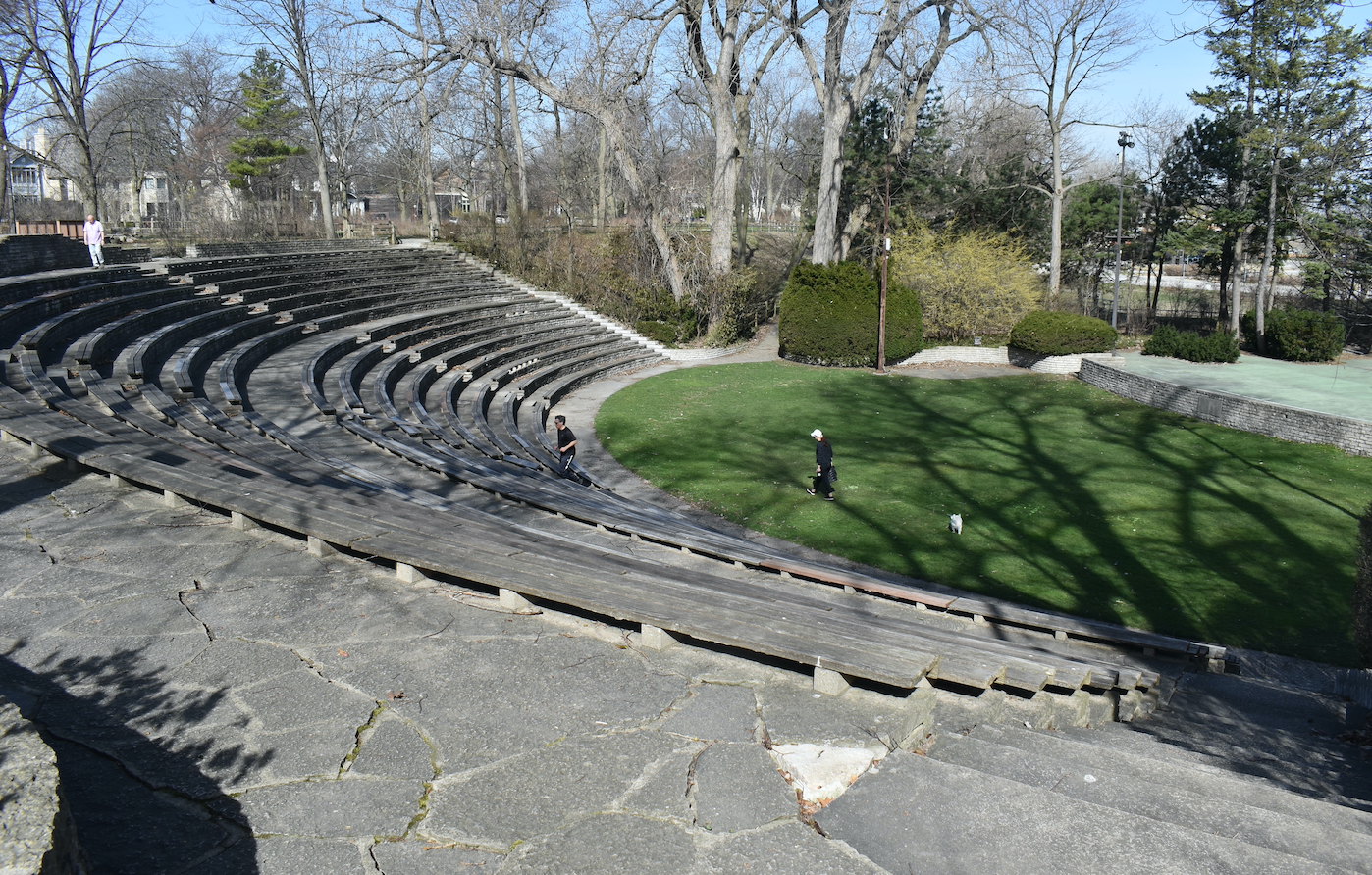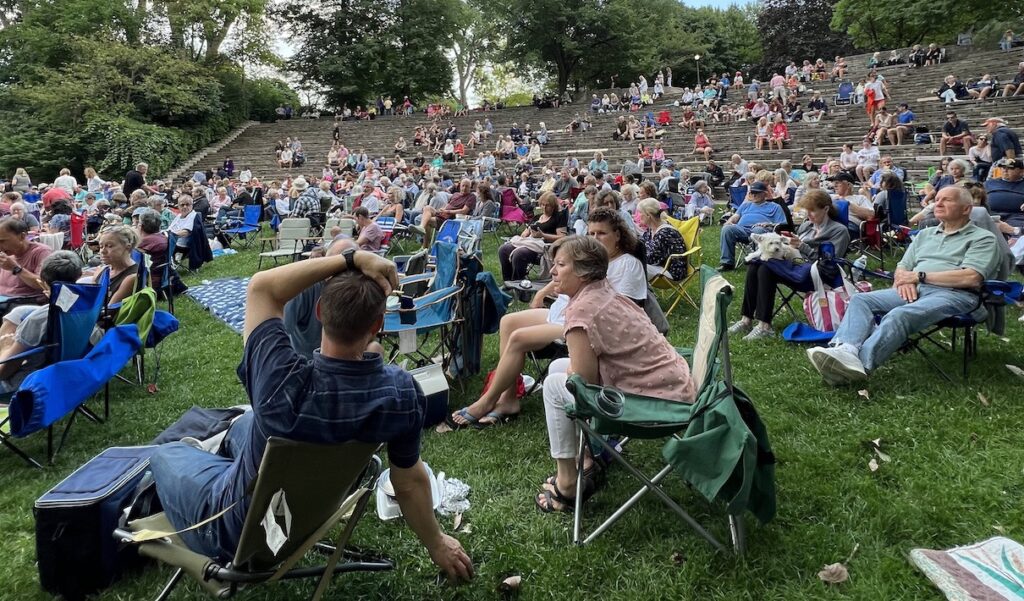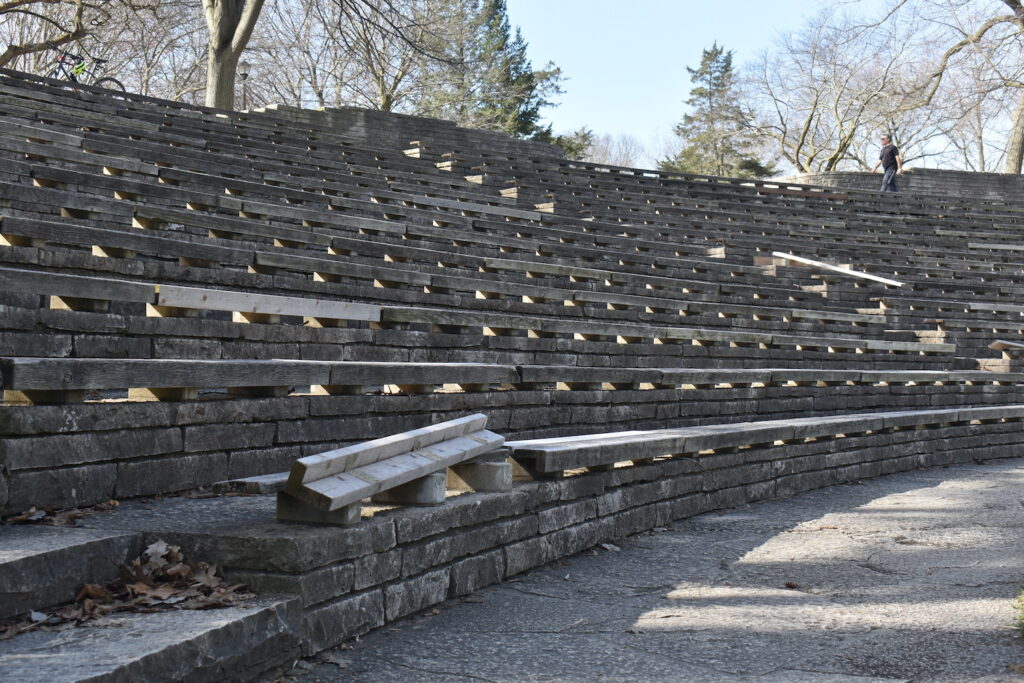
Wallace Bowl restoration may attract support of Ouilmette Foundation
History, as they say, repeats itself. And the Wilmette Park District certainly hopes that is true when it comes to the Wallace Bowl.
Today, the Ouilmette Foundation helps fund park district scholarships and special projects, but the nonprofit was formed in the 1980s to raise money for the Wallace Bowl’s restoration.
The district’s 77-year-old outdoor amphitheater could again use a pick-me-up, piquing the interest of the Ouilmette Foundation.
“We’re interested, but we haven’t committed to anything,” said Holly Gilson, president of the foundation’s board of directors. “… If we participate in the project, it would bring us back to our roots.”

The foundation recently reviewed a presentation on the Wallace Bowl’s current needs from Woodhouse Tinucci Architects. That same presentation was delivered at the Wilmette Park Board meeting on Monday, April 10.
“It is definitely in need of renovations,” said Andy Tinucci, principal at the firm, to the park commissioners. “There are definitely places where 40 years of wear and tear has taken its toll, where 40 years of settling has taken its toll, places that are not very safe.”
The Wallace Bowl was constructed as the Wilmette Outdoor Amphitheater in 1946, according to park district information. The facility was later dedicated to Gordon Wallace, who served as superintendent of Wilmette parks from 1936-1968.
Thirty-six years later, in 1982, a deteriorating Wallace Bowl led to the formation of the Ouilmette Foundation, which helped raise funds for the site’s restoration and expansion two years later.
The foundation returned in 2014 to support the park district’s annual scholarship fund and other projects and programming, and may again support Wallace Bowl improvements.
Each summer, the amphitheater hosts an outdoor concert series (Sounds of Summer), family movie nights and theater performances. It is also a popular seating and entertainment venue during the town’s Independence Day festivities.
According to Tinucci’s presentation, improvements to The Wallace Bowl — from masonry work to landscaping — could cost more than $3 million; however, the preliminary figures require more guidance from park district officials, who could decline portions of Tinucci’s recommendations.
Tinucci said the masonry requires the most significant work, including replacement of multiple damaged retaining walls and a suggested rebuild of pedestrian walkways — the latter of which is one of the most costly proposal and requires removal of all of the flagstone, pouring of a concrete foundation and relaying of the flagstone. The alternative is to repair the areas where the walkways are most dangerous, he said.

The park district must also decided on the level of upgrade it wants to make to its audio-visual equipment, which Tinucci said is significantly outdated. Tinucci also recommended a replacement of the wooden seating that currently glued atop stone to create bleachers.
Other possible add-ons discussed were hand rails and more lighting.
Tinucci estimated that a round of improvements — the first in about 40 years — could hold up for another 40 years or more.
“For a structure that’s sitting outside in the Chicagoland weather, I think 40 years is a great period of time between doing these major renovation projects,” he said. “I think some of our new recommendations could afford the district more time. It’s a much more robust solution that we are proposing with this concrete slab below the stone.”
Park commissioners suggested that the project would need to be completed in stages and agreed that more must be known about the Ouilmette Foundation’s participation before it takes further steps.
The foundation plans to meet for further discussion next week, and while Gilson said the foundation is interested in the project, too many variables exist for her to confirm its involvment.
Board Vice President Kara Kosloskus said the board must also figure out how the project fits in its long-term planning.
“This is not something as a board we’ve previously discussed with our capital planning,” she said. “Even if the foundation were to offer us $2 million … we don’t have that extra million dollars budgeted anywhere in our long-term plan at the moment. Not to say it can’t be worked around, but I think a lot of conversations need to be had.”
The Record is a nonprofit, nonpartisan community newsroom that relies on reader support to fuel its independent local journalism.
Become a member of The Record to fund responsible news coverage for your community.
Already a member? You can make a tax-deductible donation at any time.

Joe Coughlin
Joe Coughlin is a co-founder and the editor in chief of The Record. He leads investigative reporting and reports on anything else needed. Joe has been recognized for his investigative reporting and sports reporting, feature writing and photojournalism. Follow Joe on Twitter @joec2319


